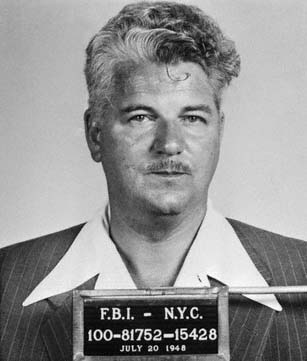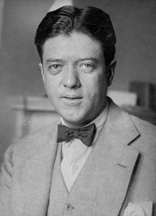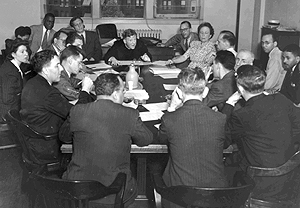|
CIO-PAC
The first-ever "political action committee" in the United States of America was the Congress of Industrial Organizations – Political Action Committee or CIO-PAC (1943–1955). What distinguished the CIO-PAC from previous political groups (including the AFL's political operations) was its "open, public operation, soliciting support from non-CIO unionists and from the progressive public. ... Moreover, CIO political operatives would actively participate in intraparty platform, policy, and candidate selection processes, pressing the broad agenda of the industrial union movement." Background In his 1993 memoir, John Abt, general counsel for the Amalgamated Clothing Workers of America under Sidney Hillman, claimed the leaders of the Communist Party of the USA had inspired the idea of the CIO-PAC: In 1943, Gene Dennis came to me and Lee Pressman to first raise the idea of a political action committee to organize labor support for Roosevelt in the approaching 1944 election. Pressman ... [...More Info...] [...Related Items...] OR: [Wikipedia] [Google] [Baidu] |
John Abt
John Jacob Abt (May 1, 1904 – August 10, 1991) was an American lawyer and politician, who spent most of his career as chief counsel to the Communist Party USA (CPUSA) and was a member of the Communist Party and the Soviet spy network "Ware Group" as alleged by Whittaker Chambers. Background Abt was born on May 1, 1904 in Chicago, Illinois. He was a graduate of the University of Chicago, and from its law school. Career Abt practiced real estate and corporate law in Chicago from 1927 to 1933. Government (1933–1938) Abt was the Chief of Litigation, Agricultural Adjustment Administration from 1933 to 1935, assistant general counsel of the Works Progress Administration in 1935 (where Lee Pressman was also working), chief counsel to Senator Robert La Follette, Jr.'s Committee from 1936 to 1937 and special assistant to the United States Attorney General, 1937 and 1938. Unions (1938–1948) From 1938 to 1948, he worked at chief counsel of the Amalgamated Clothing W ... [...More Info...] [...Related Items...] OR: [Wikipedia] [Google] [Baidu] |
Calvin Benham Baldwin
Calvin Benham Baldwin, also known as Calvin B Baldwin, C.B. Baldwin, and generally as "Beanie" Baldwin (August 19, 1902 – May 12, 1975), served as assistant to US Secretary of Agriculture Henry A. Wallace and administrator of the New Deal's Farm Security Administration in the 1930s, worked for the CIO in the 1940s, and then worked with the Progressive Party from 1948 to 1955. Background Calvin Benham Baldwin was born on August 19, 1902, in Radford, Virginia. He attended the Virginia Polytechnic Institute from 1920 to 1923. Career Early years (1923–1933) For five years during the 1920s, he worked for the Norfolk and Western Railroad. In 1929, Baldwin became the manager and owner of the Electric Sales and Service Company in East Radford, Virginia. Government service (1933–1943) With the advent of the New Deal, Baldwin became assistant to Secretary of Agriculture Henry A. Wallace. He first worked with the Agricultural Adjustment Administration (AAA) and then as assistant ... [...More Info...] [...Related Items...] OR: [Wikipedia] [Google] [Baidu] |
Lee Pressman
Lee Pressman (July 1, 1906 – November 20, 1969) was a labor attorney and earlier a US government functionary, publicly alleged in 1948 to have been a spy for Soviet intelligence during the mid-1930s (as a member of the Ware Group), following his recent departure from Congress of Industrial Organizations (CIO) as a result of its purge of Communist Party members and fellow travelers. From 1936 to 1948, he represented the CIO and member unions in landmark collective bargaining deals with major corporations including General Motors and U.S. Steel. According to journalist Murray Kempton, anti-communists referred to him as "Comrade Big." Marion Dickerman and Ruth Taylor (eds.), ''Who's Who In Labor: The Authorized Biographies of the Men and Women Who Lead Labor in the United States and Canada and of Those Who Deal with Labor.'' New York: The Dryden Press, 1946; pg.286. Background Pressman was born Leon Pressman on July 1, 1906, on the Lower East Side of in New York City, f ... [...More Info...] [...Related Items...] OR: [Wikipedia] [Google] [Baidu] |
Philip Murray
Philip Murray (May 25, 1886 – November 9, 1952) was a Scottish-born steelworker and an American labor leader. He was the first president of the Steel Workers Organizing Committee (SWOC), the first president of the United Steelworkers of America (USWA), and the longest-serving president of the Congress of Industrial Organizations (CIO). Early life Murray was born in Blantyre, Scotland, in 1886. His father, William Murray, was a Catholic coal miner and union leader who emigrated from Ireland to Scotland prior to his son's birth. His mother, the former Rose Layden, was a cotton mill weaver. Rose died when Philip was only two years old. William Murray remarried and had eight more children. Philip was the oldest boy, and after only a few years of public education, he went to work in the coal mines at 10 to help support the family. In 1902, Philip and his father emigrated to the United States. They settled in the Pittsburgh region and obtained jobs as coal miners. Young Phil ... [...More Info...] [...Related Items...] OR: [Wikipedia] [Google] [Baidu] |
Sidney Hillman
Sidney Hillman (March 23, 1887 – July 10, 1946) was an American labor leader. He was the head of the Amalgamated Clothing Workers of America and was a key figure in the founding of the Congress of Industrial Organizations and in marshaling labor's support for President Franklin D. Roosevelt and the New Deal coalition of the Democratic Party. Early life Sidney Hillman was born in Žagarė, Lithuania, then part of the Russian Empire, on March 23, 1887, the son of Lithuanian Jewish parents. Sidney's maternal grandfather was a small-scale merchant; his paternal grandfather was a rabbi known for his piety and lack of concern for material possessions.Steven Fraser, ''Labor Will Rule: Sidney Hillman and the Rise of American Labor.'' New York: The Free Press, 1991; pp. 3-4. Hillman's father was himself an impoverished merchant, more concerned with reading and prayer than with his faltering business. From a young age Sidney had shown great academic promise, mastering the rote memorizati ... [...More Info...] [...Related Items...] OR: [Wikipedia] [Google] [Baidu] |
Congress Of Industrial Organizations
The Congress of Industrial Organizations (CIO) was a federation of unions that organized workers in industrial unions in the United States and Canada from 1935 to 1955. Originally created in 1935 as a committee within the American Federation of Labor (AFL) by John L. Lewis, a leader of the United Mine Workers (UMW), and called the Committee for Industrial Organization. Its name was changed in 1938 when it broke away from the AFL. It focused on organizing unskilled workers, who had been ignored by most of the AFL unions. The CIO supported Franklin D. Roosevelt and his New Deal coalition, and membership in it was open to African Americans. CIO members voted for Roosevelt at the 70+% level. Both the CIO and its rival the AFL grew rapidly during the Great Depression. The rivalry for dominance was bitter and sometimes it was violent. In its statement of purpose, the CIO said that it had formed to encourage the AFL to organize workers in mass production industries along industria ... [...More Info...] [...Related Items...] OR: [Wikipedia] [Google] [Baidu] |
Victor Perlo
Victor Perlo (May 15, 1912December 1, 1999) was an American Marxist economist, government functionary, and a longtime member of the governing National Committee of the Communist Party USA. Biography Early years Victor Perlo was born May 15, 1912 in East Elmhurst, Queens, New York City, N.Y. Perlo was the son of ethnic Jewish parents who had both emigrated in their youth to America from the Russian empire.Autobiography prepared by Perlo and relayed in summary form to Moscow in December 1944 by KGB Washington Station Chief Anatoly Gorsky, KGB file 45100, v. 1, pp. 44-45; transcribed in Vassiliev White Notebook #3, pp. 72-73 and published in John Earl Haynes, Harvey Klehr, and Alexander Vassiliev, ''Spies: The Rise and Fall of the KGB in America.'' New Haven, CT: Yale University Press, 2009; pp. 271-272. His father, Samuel Perlo, was a lawyer and his mother, Rachel Perlo, was a teacher. Perlo received his bachelor's degree from Columbia University in New York City in 1931 and mas ... [...More Info...] [...Related Items...] OR: [Wikipedia] [Google] [Baidu] |
Perlo Group
Headed by Victor Perlo, the Perlo group is the name given to a group of Americans who provided information which was given to Soviet intelligence agencies; it was active during the World War II period, until the entire group was exposed to the FBI by the defection of Elizabeth Bentley. It had sources on the War Production Board, the Senate La Follette Subcommittee on Civil Liberties, and in the United States Department of Treasury. Evidence Account of Elizabeth Bentley On July 31, 1948, Elizabeth Bentley testified before the House Un-American Activities Committee (HUAC): MISS BENTLEY: I had one other group that I handled, and I had every reason to believe there were other groups also. MR. STRIPLING: What was the other group that you handled? MISS BENTLEY: We called it the Perlo group. It was actually an ex-Communist Party unit that I believe had been set up in Washington in the early thirties, and I gather, from what the members of the group told me, that they had been ... [...More Info...] [...Related Items...] OR: [Wikipedia] [Google] [Baidu] |
Franklin D
Franklin may refer to: People * Franklin (given name) * Franklin (surname) * Franklin (class), a member of a historical English social class Places Australia * Franklin, Tasmania, a township * Division of Franklin, federal electoral division in Tasmania * Division of Franklin (state), state electoral division in Tasmania * Franklin, Australian Capital Territory, a suburb in the Canberra district of Gungahlin * Franklin River, river of Tasmania * Franklin Sound, waterway of Tasmania Canada * District of Franklin, a former district of the Northwest Territories * Franklin, Quebec, a municipality in the Montérégie region * Rural Municipality of Franklin, Manitoba * Franklin, Manitoba, an unincorporated community in the Rural Municipality of Rosedale, Manitoba * Franklin Glacier Complex, a volcano in southwestern British Columbia * Franklin Range, a mountain range on Vancouver Island, British Columbia * Franklin River (Vancouver Island), British Columbia * Franklin Strai ... [...More Info...] [...Related Items...] OR: [Wikipedia] [Google] [Baidu] |
Elizabeth Bentley
Elizabeth Terrill Bentley (January 1, 1908 – December 3, 1963) was an American spy and member of the Communist Party USA (CPUSA). She served the Soviet Union from 1938 to 1945 until she defected from the Communist Party and Soviet intelligence by contacting the Federal Bureau of Investigation (FBI) and admitting her own activities. She became widely known after testifying in a number of trials and before the House Un-American Activities Committee (HUAC). In 1952, Bentley became a US informant and was paid by the FBI for her participation in investigations and frequent appearances before Congressional committees. She exposed two spy networks, ultimately naming more than 80 Americans who she said had engaged in espionage. Early life Elizabeth Terrill Bentley was born in New Milford, Connecticut, the daughter of dry-goods merchant Charles Prentiss Bentley and schoolteacher May Charlotte Turrill. Her parents moved to Ithaca, New York in 1915 and, by 1920, the family had reloc ... [...More Info...] [...Related Items...] OR: [Wikipedia] [Google] [Baidu] |
Strike Action
Strike action, also called labor strike, labour strike, or simply strike, is a work stoppage caused by the mass refusal of employees to Labor (economics), work. A strike usually takes place in response to grievance (labour), employee grievances. Strikes became common during the Industrial Revolution, when Labour economics, mass labor became important in factories and mines. As striking became a more common practice, governments were often pushed to act (either by private business or by union workers). When government intervention occurred, it was rarely neutral or amicable. Early strikes were often deemed unlawful conspiracies or anti-competitive cartel action and many were subject to massive legal repression by state police, federal military power, and federal courts. Many Western nations legalized striking under certain conditions in the late 19th and early 20th centuries. Strikes are sometimes used to pressure governments to change policies. Occasionally, strikes destabilize ... [...More Info...] [...Related Items...] OR: [Wikipedia] [Google] [Baidu] |
Fair Employment Practices Commission
The Fair Employment Practice Committee (FEPC) was created in 1941 in the United States to implement Executive Order 8802 by President Franklin D. Roosevelt "banning discriminatory employment practices by Federal agencies and all unions and companies engaged in war-related work."Executive Order 8802: Prohibition of Discrimination in the Defense Industry (1941)" Our Documents, Executive Order 8802 dated June 25, 1941, General Records of the United States Government; Record Group 11; National Archives That was shortly before the United States entered World War II. The |






